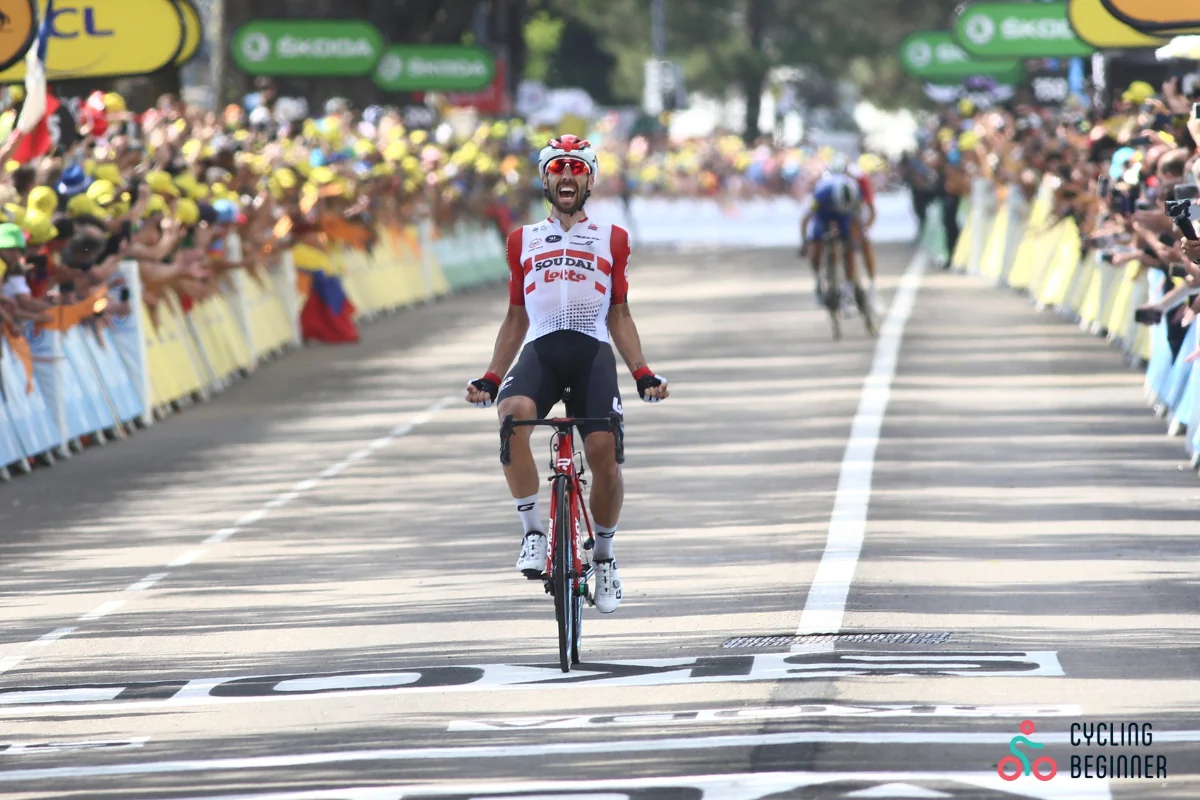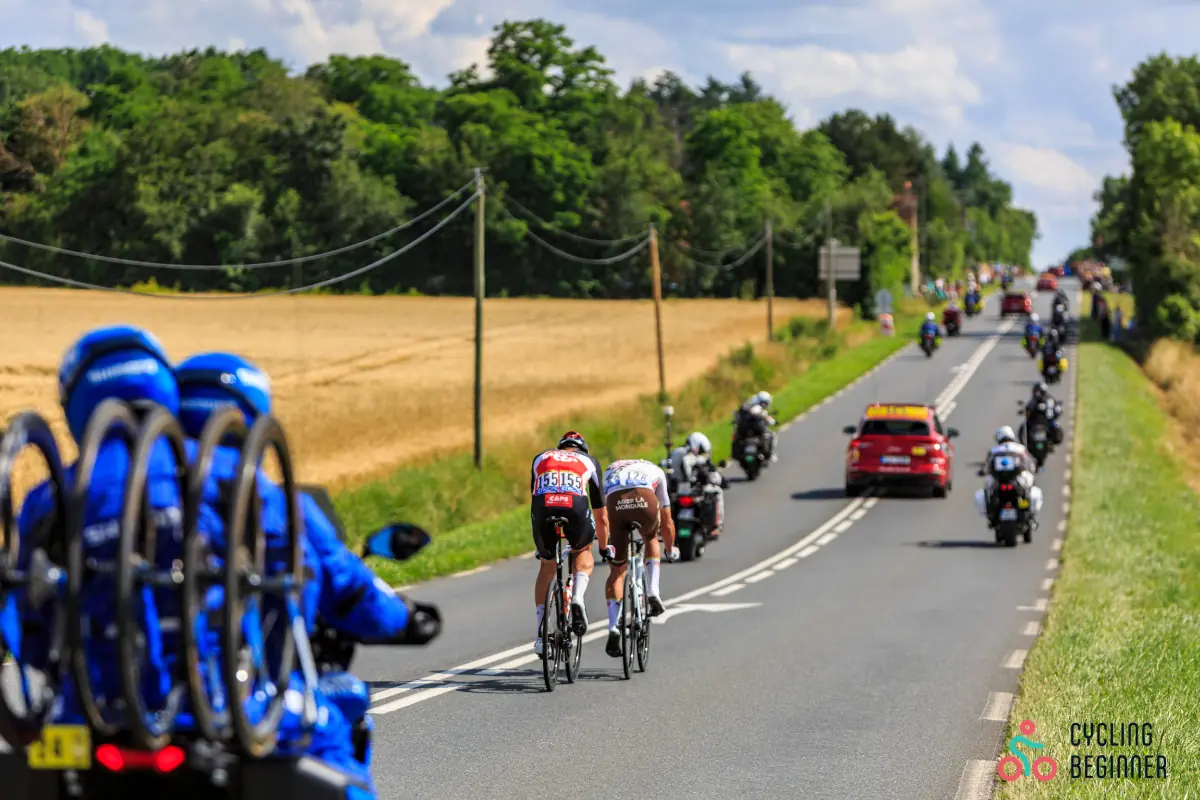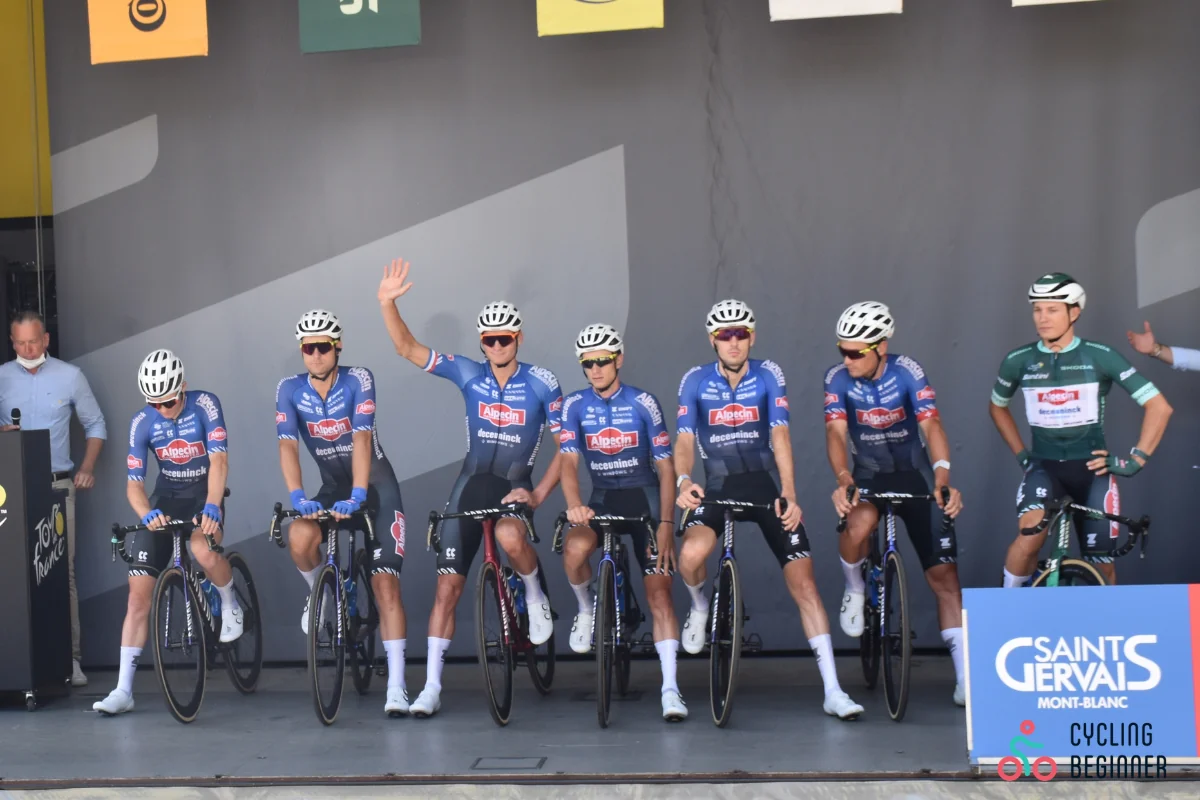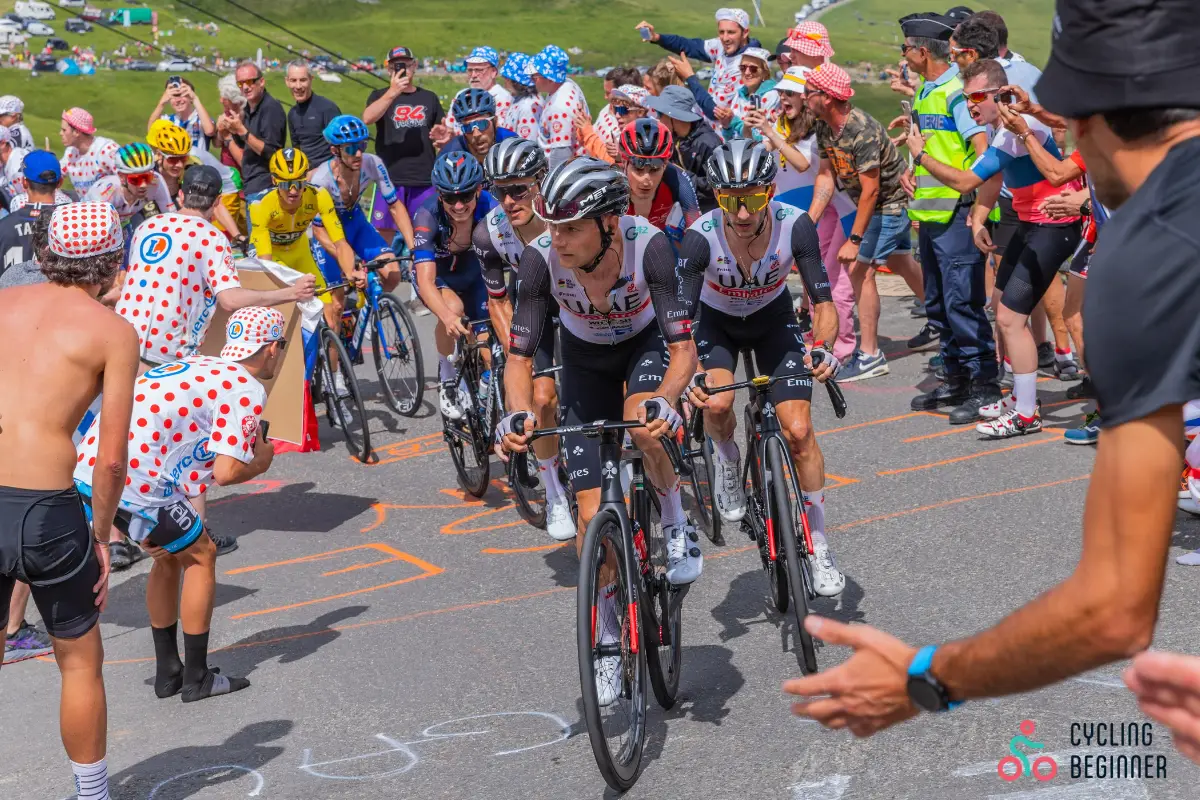The Tour de France is the biggest cycling race in the world, which is also reflected in the prize fund, the highest in the world of cycling at €2.3 million ($2.5 million).
The Tour de France winner gets €500,000 ($535,000), while a runner-up gets 200,000 ($215,000). A green and polka jersey are worth €25,000 ($27,000), and a white jersey €20,000 ($21,500). The most combative cyclist receives €20,000 ($21,500). For a stage win, a cyclist gets €11,000 ($11,800).
It is certainly worth winning the Tour de France, but prize money is by no means the main motivation for cyclists. The prestige of winning is far greater than the money.
The General Classification – Yellow Jersey

Winning overall classification is like hitting a jackpot. You win the yellow jersey, one of the most prestigious pieces of clothing in cycling, and go home with a significant payday.
The winner gets a bit more than 20% of the prize pool just for the overall win, while the runner-up gets more than half less. The amount then starts to decrease drastically down the rankings.
While the winner gets quite a hefty amount of money, not much of it remains to him. The tradition dictates that the winner splits his prize money among all the team members that helped him win. He’s left with just his salary, which isn’t bad either.
Additionally, a cyclist gets €500 ($535) each day that he’s the general classification leader.
The prize money is not awarded only to those at the top of the general classification. Every rider that finishes the race gets at least a symbolic prize. The top 19 riders get higher prizes, while riders from 20th place onwards get €1000 ($1100).
| Final ranking | Prize money |
|---|---|
| 1st place | €500,000 / $535,000 |
| 2nd place | €200,000 / $215,000 |
| 3rd place | €100,000 / $110,000 |
| 4th place | €70,000 / $75,000 |
| 5th place | €50,000 / $54,000 |
| 6th place | €23,000 / $25,000 |
| 7th place | €11,500 / $12,500 |
| 8th place | €7,600 / $8,100 |
| 9th place | €4,500 / $4,800 |
| 10th place | €3,800 / $4,100 |
| … | |
| 19th place | €1,100 / $1,200 |
| 20th place | €1,000 / $1,100 |
The Mountain Clasiffication – Polka Dot Jersey

If any jersey can compare to the yellow jersey, it is certainly the polka dot jersey.
Many fans at the roadside wear the polka dot jersey, but it is also popular among cyclists.
Winning the mountain classification is a nice motivation for those who cannot hope to win overall but are still great at climbing. These are usually the lightest riders in the peloton, who have an advantage on the climbs due to their low weight.
The mountain classification leader receives €300 ($320) each day, while the main prize awaits the rider who brings the polka dot jersey to Paris.
| Final mountain ranking | Prize money |
|---|---|
| 1st place | €25,000 / $26,700 |
| 2nd place | €15,000 / $16,000 |
| 3rd place | €10,000 / $10,700 |
| 4th place | €4,000 / $4,300 |
| 5th place | €3,500 / $3,700 |
| 6th place | €3,000 / $3,200 |
| 7th place | €2,500 / $2,700 |
| 8th place | €2,000 / $2,100 |
Cyclists also receive some prize money if they are the first to reach the climb’s summit. The amount varies depending on the climb category.
There is also a special prize of €5,000 ($5,300), the Souvenir Henri Desgrange, for the first rider to cross the highest point of the race. It is named in honor of the race’s founder and first race director.
While the Souvenir Henri Desgrange is awarded annually, there is another prize that is awarded only occasionally. It’s called Souvenir Jacques Goddet in honor of the second race director, and it’s awarded to the first cyclist on the summit of Col de Tourmalet. If the climb is included in the race, the first rider on top receives €5,000 ($5,300).
The prizes at other climbs are presented in the table below.
| 1st place | 2nd place | 3rd place | |
|---|---|---|---|
| Hors Categorie | €800 / $850 | €450 / $480 | €300 / $320 |
| 1st category | €650/ $700 | €400 / $430 | €150 / $160 |
| 2nd category | €500 / $530 | €250 / $270 | |
| 3rd category | €300 / $320 | ||
| 4th category | €200 / $215 |
The Point Classification – Green Jersey

It’s not just the climbers who collect points throughout the race but also sprinters and all-rounders. They fight for the green jersey and collect points in intermediate sprints and at the finish of each stage.
In addition to the points, prize money is awarded to the top three cyclists in each intermediate sprint. The winner receives €1500 ($1,600), the runner-up €1000 ($1,100) and the third €500 ($530).
The green jersey is as valuable as the polka dot jersey, which is also reflected in prize money. Again, the leading rider receives €300 ($320) each day, and the overall prize money is the same as that awarded for the mountain classification.
| Final points ranking | Prize money |
|---|---|
| 1st place | €25,000 / $26,700 |
| 2nd place | €15,000 / $16,000 |
| 3rd place | €10,000 / $10,700 |
| 4th place | €4,000 / $4,300 |
| 5th place | €3,500 / $3,700 |
| 6th place | €3,000 / $3,200 |
| 7th place | €2,500 / $2,700 |
| 8th place | €2,000 / $2,100 |
Youth Classification – White Jersey

The youth classification is the only one that is limited only to some riders. Not every cyclist on the Tour de France can win the white jersey.
As the name suggests, the classification is intended for young riders. Only riders who are 25 years old or younger on 1 January in the year of the race or not older than 26 at the time of the race can compete for the white jersey.
The wearer of the white jersey gets €300 ($320) each day – the same as other non-general classifications – but the final prize is slightly lower, and fewer riders receive it.
| Final youth ranking | Prize money |
|---|---|
| 1st place | €20,000 / $21,300 |
| 2nd place | €15,000 / $16,000 |
| 3rd place | €10,000 / $10,700 |
| 4th place | €5,000 / $5,300 |
Stage Win

Cyclist that can’t win in any classification – and there is a lot of them – try to get at least a stage win. Winning a stage at the Tour de France is one of the most prestigious wins a cyclist will get in a career and can often be a career-changing moment.
There are only 21 stages on the Tour de France, so only 21 cyclists can get a stage win, but usually, there will be fewer as some cyclists win multiple times.
But it’s not just about the prestige you get from winning a stage. You also get a nice financial reward if you cross the finish line first. A total of €28,650 ($30,600) is shared among the riders on every stage.
| Final ranking | Prize money |
|---|---|
| 1st place | €11,000 / $11,700 |
| 2nd place | €5,500 / $5,900 |
| 3rd place | €2,800 / $3,000 |
| 4th place | €1,500 / $1,600 |
| 5th place | €830 / $890 |
| 6th place | €780 / $830 |
| 7th place | €730 / $780 |
| 8th place | €670/ $715 |
| 9th place | €650 / $690 |
| 10th place | €600 / $640 |
| … | |
| 14th place | €340/ $360 |
| 15th place | €300 / $320 |
| … | |
| 20th place | €300 / $320 |
Combativity Award – Gold Number

The organizers select the most combative cyclist of the day at the end of each stage. He’s given €2,000 ($2,100) for his effort and can wear a gold number on the next stage. It used to be a red number, but the color changed in 2023 due to a new sponsor.
At the end of the race, one cyclist is also named the most aggressive cyclist. This title is earned by regular attacks, taking part in breakaways and other actions that add spice to the race. He’s rewarded with €20,000 ($21,300).
Team Classification – Yellow Number

The Tour de France is not just about cyclists competing against each other, but also teams. The times of the top three riders on each stage are added to the team time.
It’s a less relevant classification, but it does have some benefits. Members of the leading team can wear yellow numbers on the stage to indicate their lead in the team standings. The leading team also receives €2,800 ($3,000) before the start of the stage.
The winning team is also rewarded handsomely at the end of the race. The prize is higher than in the other classifications, except for the overall standings, but the prize is shared between all team members.
| Final team ranking | Prize money |
|---|---|
| 1st place | €50,000 / $54,000 |
| 2nd place | €30,000 / $32,000 |
| 3rd place | €20,000 / $21,300 |
| 4th place | €12,000 / $12,800 |
| 5th place | €8,000 / $8,500 |
Best Teammate Award

Although it may not seem like it at first glance, cycling is a team sport. A cyclist must rely heavily on his teammates to win the yellow jersey.
It is a relatively new award that even some Tour de France riders know nothing about. It is awarded three times throughout the race, at the end of each week. The winner is voted by fans on social media. He receives €3,000 ($3,200).
How does the Tour de France prize money compare to other races?
While the Tour de France is the biggest race, it’s certainly not the only one. Every year, there are a huge number of races, ranging from one day to 21 days.
It is easiest to compare the Tour de France with the other two three-week races. Only the Giro d’Italia and La Vuelta a Espana can afford prize money comparable to the Tour de France.
However, the prize money in these two races is much smaller than in the Tour de France. The total amount is almost two times smaller, which is particularly noticeable in the winners’ prize.
You can see a comparison of the prize money in the table below.
| Tour de France | Giro d’Italia | La Vuelta | |
|---|---|---|---|
| Total prize fund | €2,300,000 / $2,800,000 | €1,500,000 / $1,600,000 | €1,100,000 / $1,200,000 |
| The general classification | €500,000 / $535,000 | €115,000 / $123,000 | €150,000 / $160,000 |
| The points classification | €25,000 / $26,700 | €10,000 / $10,600 | €11,000 / $11,700 |
| The mountain classification | €25,000 / $26,700 | €5,000 / $5,300 | €13,000 / $13,900 |
| The youth classification | €20,000 / $21,300 | €10,000 / $10,700 | €11,000 / $11,700 |
| Stage win | €11,000 / $11,700 | €11,000 / $11,700 | €11,000 / $11,700 |
| Combativity Award | €20,000 / $21,300 | €4,000 / $4,300 | €3,000 / $3,200 |
| Team Classification | €50,000 / $54,000 | €5,000 / $5,300 | €12,500 / $13,300 |

